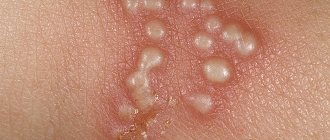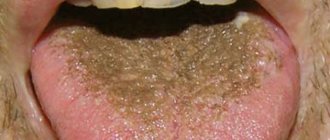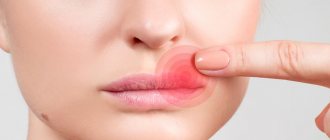Herpes on the lips (lat. Herpes labialis, in everyday life the names cold sores or fever on the lips are sometimes used) is a consequence of infection with a certain type of herpes virus. This disease is one of the common infectious diseases of the skin and mucous membranes, which is easily transmitted between people.
There are 8 known types of herpes simplex virus, and each type predominantly causes herpetic lesions of a certain type. Herpes on the lips is initiated by infection with the herpes simplex virus type 1, much less commonly with type 2. The type 1 virus can also cause other diseases, for example herpetic stomatitis, herpetic keratoconjunctivitis.
How does primary infection occur?
Often, the initial infection with a herpes infection has no symptoms and is not noticeable. But it happens that complications appear along with herpes:
- gingivostomatitis - inflammation of the oral mucosa and gums;
- an increase in temperature, accompanied by the appearance of blisters and ulcers in the mouth;
- herpetic panaritium (inflammation of the finger tissue) - the infection can spread to the fingers if they are pulled into the mouth;
- rashes can occur throughout the oral cavity, affecting the gums, which turn red and bleed. The child refuses to eat because the process becomes painful.
How does herpes develop?
Herpes has several stages of development:
- at the first stage, unpleasant sensations appear in the lip area, already at this time it is necessary to begin treatment of herpes in order to prevent the transition to the next stage;
- at the second stage, inflammation of the mucous membrane appears, small blisters may appear;
- at the third stage, the blisters enlarge and may burst, leaving small ulcers in their place;
- The fourth stage is characterized by the appearance of scabs at the site of ulcers, which disappear upon healing.
It is important to monitor your body, and if other symptoms appear and your condition worsens, contact the clinic for competent help.
How to fight a “cold”?
If herpes appears for the first time or in a baby under 6 months, and the disease is accompanied by fever and affects not only the lips, then you need to consult a pediatrician for antiviral therapy.
Often recurrent infections go away on their own. But you can shorten their duration by using local antiherpetic agents (active ingredient acyclovir).
Ways to reduce discomfort:
- apply a cold compress to the area of the rash;
- avoid sour and spicy foods;
- choose cool drinks;
- if there is severe pain, then use ibuprofen or paracetamol;
- Do not use products containing lidocaine due to possible side effects or overdose.
How to prevent the spread of the virus:
- it is important to ensure that the child does not scratch the rash and wash his hands;
- use individual dishes, towels, toothbrushes for a child with a herpes infection;
- during an exacerbation, you should not engage in contact sports;
- a child with a “cold” on his lips should not kiss other people.
Causes of herpes
The herpes virus is constantly in the body, but it is passive. Its appearance can be provoked by a decrease in immunity and, as a result, illness. Herpes can appear not only on the lips, but also on other mucous membranes - nose, eyes, genitals.
In addition to decreased immunity or a cold, the following factors can affect the appearance of herpes:
- severe hypothermia or overheating;
- stressful situation;
- mechanical injuries of the lip;
- severe intoxication of the body;
- excessive consumption of alcohol or tobacco;
- lack of vitamins in the body;
- pregnancy or hormonal imbalances;
- HIV;
- diabetes;
- contact with a sick person.
Types of drugs
The main group of tablets recommended for the effective treatment of herpes includes four nucleosides with similar effects - acyclovir, penciclovir, valacyclovir and famciclovir. An impressive part of the preparations use one of the above substances as the main component. It should be noted that components such as valacyclovir and famciclovir are not active.
Their activation begins only after they enter the digestive tract, where the transformation process occurs. Valaciclovir is converted to acyclovir, and famciclovir is converted to penciclovir. The substances affect the DNA synthesis of the replicating virus without affecting the pathogen that is in a latent state.
Based on their composition, herpes tablets can be divided not only according to the main components, but also according to their special properties.
For targeted treatment, doctors use:
- Medicines of a narrow specialization, so-called antiherpetic drugs (Acyclovir, Valtrex, Zovirax);
- Medicines related to immunomodulators (Anaferon, Galavit);
- It is possible to use interferon-containing agents, but some experts question the advisability of their use (Reaferon);
- Drugs that stimulate the body's production of its own interferon. This treatment regimen helps increase the intensity of the immune response to the virus (Arbidol, Lavomax, Cycloferon).
Antiviral
Antiviral immunostimulating agents come in a wide variety and are prescribed to support immunity. Such drugs are recommended not only for herpetic infections; there can be a great many indications for starting use.
Immunomodulators and antiviral drugs have general indications and their scope of application:
- Herpes of varying severity;
- Preventive measures and seasonal therapy of respiratory diseases;
- Fighting viral hepatitis;
- Treatment of cytomegalovirus;
- In joint therapy of multiple sclerosis, encephalitis, viral eye damage;
- Chlamydia;
- Tuberculosis.
Immunomodulators
Support of the immune system, in the case of herpetic disease, is prescribed for relapses, extensive lesions that abundantly cover the patient’s skin and mucous membrane. The most popular medication is Isoprinosine; herpes medications containing this substance are also prescribed.
What should you know about the symptoms?
You can identify herpes diseases (photo) on the lip by searching for information on the Internet. Naturally, there are many examples of how this deviation looks and manifests itself. The doctor will be able to confirm it, as well as the results of the tests that were carried out. Such a disease can be easily identified by people who have previously suffered from it.
Let's look at what stages of herpes exist and how they will manifest themselves:
- 1 day. The stage is called prodromal. At this stage, you can observe redness of the lips, itching, tingling, and discoloration of the skin on the lips. This stage takes several days in different cases. It is advisable to begin treatment at this stage, because it is possible to reduce both the duration of the disease and its severity.
- Stages of inflammation. In most cases, it occurs on the first day immediately after the itching appears. In the affected area of the skin, the virus begins to divide and multiply, a swelling appears on the lip, and not only redness, but also swelling occurs.
- This stage appears somewhere on the second or third day. Large, hard blisters appear on the lips. They contain a clear liquid that will become cloudy. Touching damaged skin can be quite painful. It is in this place that the herpes virus accumulates; the fluid itself is very contagious.
- The next stage is characterized by the bursting of bubbles. In fact, there is one large wet sore on the lip. Often at this time the body temperature increases and the lymph nodes begin to grow.
- From 5 to 8 days, sores appear at the site of the wound. They can be brown or yellow. At this stage, the carrier is contagious, the disease is easily transmitted through liquid. The cracks may continue to ooze fluid containing herpes.
- The next step can take from 8 days to 2 weeks. During this period, new skin appears on the lips, the crusts will peel off on their own. They must be endured and not torn off, otherwise new frames may appear later. The recovery period can vary markedly, depending on the stage at which treatment of the disease began.
Main forms of the disease
The symptoms of the herpes virus in women and men are the same. However, the viral pathology itself can be acute or chronic. Moreover, any incorrectly selected therapy leads to the transition of the disease to the chronic stage.
There are three forms of herpes on the palate of the mouth in adults or any other location:
- Mild and asymptomatic herpes is characterized by the absence of characteristic blisters, however, hyperemia and swelling may be noted on the mucous membrane. Patients often have a slightly elevated body temperature and general weakness.
- Moderate damage is characterized by clear specific symptoms, and the intoxication syndrome is pronounced.
- The disease of severe severity is characterized by a significant increase in body temperature (up to 39-40 ° C), a profuse rash, including on the patient’s skin, as well as damage to peripheral lymph nodes, primarily cervical and submandibular.
Identifying a specific form of herpetic infection allows you to select additional examination methods and effective therapy.
What should you know about treatment?
Whatever drug is offered for use, it is worth remembering that it will not be possible to cure herpes once and for all. Any medication can inhibit the replication of the virus, but they will not be able to eradicate the problem that is embedded in the DNA. Each time the immune system weakens, a favorable environment for the development of the disease will appear, and herpes will progress.
As for treatment, doctors most often recommend using the following drugs:
- Acyclovir cream or ointment 5%. There are many analogues of the drug - Zovirax, Acyclovir-acri, Hexal, Sandoz. A distinctive feature of these medications is that they cost little, especially if they were produced in Russia. The downside is that the effectiveness of these funds will also be low. In addition, the drugs have distinctive features - they are suitable for every person, regardless of age, which cannot always be said about other medications. The main disadvantage of this drug is that more than 50% of viruses easily tolerate Acyclovir. In addition, it does not penetrate very well through the crust and skin on the lips and does not disperse into the tissues.
- Fenistil-pentsivir. It is one of the most popular remedies aimed at combating this disease. The main substance is penciclovir. About 0.2% of bacteria are resistant to this substance, which increases the chances of recovery. This drug can only be used by patients over 12 years of age. The medication contains substances that will help speed up the absorption of the component through the crust, that is, it reaches the skin as much as possible. The advantage of the drug is that it blocks the reproduction of the virus for up to 48 hours after application. In fact, the medication accumulates in the tissues. Compared to the previous substance, the cost of this will be higher, up to 330 rubles.
We recommend reading: Botox or Dysport - which is better?
How to treat herpes on the inside of the lip? Medicines and folk remedies
Manifestations of the herpes simplex virus type 1 can be localized both on the outside of the lips and on the inside.
In such cases, treatment may be delayed due to constant contact of the affected areas with saliva.
Therefore, drug therapy for herpes inside the lip has a special approach.
Symptoms of herpes inside the lip
- the formation of small bubbles, which can form groups of 5-10 pieces or more and are filled from the inside with a clear liquid;
- burning;
- swelling of the affected lip;
- slight increase in body temperature;
- tingling sensation in areas where rashes are localized;
- in rare cases, with severe disease - headache, joint pain, fever and chills.
Compared to the form of cold sores that appear on the outside of the lips, cold sores inside the lips can go away faster even without targeted treatment.
Causes of the disease
The HSV-1 virus, once entered into the body, remains in it forever in a latent and conditionally harmful form.
Over the course of a lifetime, this disease may not manifest itself in any way, or, on the contrary, it may worsen regularly. It depends on the immunity of the specific carrier.
In turn, the activity of the immune system can be disrupted under the influence of such negative factors:
- excessive fatigue;
- hormonal imbalances;
- exacerbation of any infectious chronic diseases;
- suffered stress;
- avitaminosis;
- general hypothermia of the body.
Stages of development
Herpes inside the lip develops in several stages.
Further, herpes develops as follows:
- Stage I. The average duration is up to two days, during which foci of inflammatory processes in the mouth only form and appear as redness with a diameter of no more than 5 millimeters. When you touch such areas, tingling, irritation or pain is felt.
- Stage II. Inflammation intensifies, pain becomes more pronounced, and redness begins to degenerate into dense swelling.
- Stage III. The swellings develop into blisters, and if they are too close to each other, they can merge into a single formation. Pus and lymph accumulate inside the blisters, and in this fluid the concentration of the herpes virus is too high to pierce or open these formations on your own. This can lead to infection of the oral mucosa.
- Stage IV. The blisters burst, their contents come out, and ulcers or erosions form in place of the blisters. This stage is the most dangerous in terms of transmitting the virus to others. Therefore, during this period, which can last up to three days, it is necessary to carefully monitor compliance with the rules hygiene and avoid close bodily contact with other people.
This is especially true for kissing.At this time, the patient himself feels the most severe pain during the entire period of the disease.
In the most severe cases, a short-term deterioration in general health is possible in the form of enlarged lymph nodes and pain in them, as well as swelling of the neck, lower face and lips.
At the fifth stage, healing of the ulcers occurs.
Treatment
Treatment of herpes on the inside of the lip is longer and more complex than the treatment of herpes on the outside.
This is due to damage to the mucous membrane, on which dry crusts do not form during healing.
Moreover, external ointments applied to the affected areas also do not remain on this surface for a long time (they are washed off with saliva).
They are absorbed into the blood and act from the inside, and the dosage of active components in them is higher than in ointments and gels.
Smoking should also be limited during this period.
At the same time, you need to include fresh fruits and vegetables in your diet. They help strengthen the immune system, resulting in faster treatment.
Drug therapy
To treat herpes inside the lip, it is better to use the least toxic drugs that will not have an additional irritating effect on the mucous membrane.
Such means are:
- acyclovir;
- medovir;
- valacyclovir;
- herpevir;
- Zovirax;
- virolex.
But among these preparations there may be gels that are less preferable for application to internal surfaces.
Due to their thinner consistency, they are quickly washed off from the affected surface with saliva.
Ointments are more viscous, so they last longer.
After applying the drug, you should try not to swallow saliva and refrain from eating for the next half hour.
After this time, your mouth should be rinsed well.
What is worth knowing about the causes of the disease?
If you see a cold on your lip and find a photo of a similar disease on the Internet, then it’s worth finding out more about it. Typically, doctors divide the manifestation of herpes on the lips into 2 forms:
- Primary herpes. This means that the disease manifests itself in this person for the first time.
- Herpes is recurrent. A disease that has already made itself felt and is now reappearing.
In order to become more familiar with the disease, it is necessary to understand which of them will manifest itself when.
We recommend reading: Rf lifting: reviews
1.What is stomatitis, its types and symptoms
The term stomatitis refers to inflammatory processes in the oral cavity
that cause pain.
Stomatitis can cause discomfort and pain and interfere with eating, sleeping, and other daily activities. Canker sores can occur anywhere in the mouth, including the inside of the cheeks, gums, tongue, lips, and roof of the mouth
.
Types of stomatitis
There are several types of stomatitis, the main ones being:
- Ulcers
, also called aphthous ulcers. They usually appear in the mouth on the cheeks, tongue or lip, and appear as pale or yellowish sores with a red outer border; - Herpes
. Cold sores are fluid-filled sores that are located on or around the lips. Herpes on the gums and upper jaw also occurs, but very rarely. Herpes on the lips first looks like blisters filled with liquid, and then a crust or sore forms on it. Before a cold sore appears, there is often an itching, tingling or burning sensation on the lip. - Irritation of the oral mucosa
. It can be caused by biting the cheeks, tongue or lips, wearing braces, damage to the mucosa from a broken or sharp tooth, burns to the mouth from eating too hot food or liquids, gingivitis and other gum infections, and some autoimmune diseases. For example, systemic lupus, Crohn's disease or Behçet's disease. Mucosal irritation and stomatitis can be a side effect of treatment for other diseases - chemotherapy, antibiotics, drugs used to treat rheumatoid arthritis, epilepsy.
Symptoms of stomatitis
Symptoms of stomatitis depend on what type of stomatitis appears. So, mouth ulcer
usually painful and lasts 5 to 10 days. Often the ulcer appears again. And it is usually not associated with any colds.
Herpes
on the lip is not always painful. Rather, it causes discomfort. Herpes goes away in 7-10 days and its appearance is often a consequence of colds and flu.
A must read! Help with treatment and hospitalization!
Treatment of herpes
If you have herpes, it is not necessary to immediately contact an immunologist, because the manifestation of this disease up to 4 times a year is considered normal. If the disease bothers you more often, then contacting a specialist is necessary.
To get rid of herpes, drug treatment is most often used. Antiviral ointments are used, which are sold at any pharmacy, and immunostimulating drugs can also be used.
If the necessary medications are not available when symptoms of herpes appear, then you can use folk remedies: garlic, toothpaste or fir oil. Use garlic internally, as it is considered a good antiviral agent, and smear the area of inflammation with either toothpaste or fir oil. Our patients note in their reviews that folk remedies sometimes help to cope with a sore faster than proven medications.
Remember the most important thing: if herpes begins to bother you more than 4 times during the year, contact a specialist.
4. Treatment of stomatitis
Stomatitis is treated by dentists.
In general, mouth ulcers usually go away in no longer than two weeks, even without treatment. If the causes of the ulcer are established, the doctor will be able to choose the appropriate treatment. If they are not known, the main therapy will be aimed at alleviating the symptoms of the disease.
The following measures can help relieve pain and inflammation in the mouth:
- You should avoid hot drinks and foods, as well as salty, hot, spicy foods and citrus fruits;
- For severe pain, you can take painkillers;
- Rinsing your mouth with cool water or a small amount of ice can help relieve the burning sensation in your mouth.
To treat an ulcer, which is aimed at eliminating discomfort and protecting against infection, your doctor may recommend drinking more water and rinsing your mouth with salt water. Local anesthesia (such as lidocaine) may relieve pain. But this method for treating stomatitis in children is not recommended. A mixture of hydrogen peroxide and water in a 1:1 ratio or regular baking soda and water can be applied pointwise to the ulcer area. In addition, dentists may prescribe pain-relieving medications and corticosteroid pastes that can protect the affected areas on the lips and gums. Anti-inflammatory pastes, gels and rinses treat ulcers quite effectively and help reduce swelling and pain. They are also effective for severe cases of herpes on days 3-4, when the virus has disappeared but inflammation remains.
In any case, you should consult your doctor before taking medications, as some medications have side effects and are not recommended for people with diabetes and other diseases.
Treatment of herpes
There is no cure for herpes as such. We can only recommend lubricating the area of inflammation with special ointments (usually they contain acyclovir) and applying ice.
Sometimes doctors prescribe antiviral pills for herpes. Some experts believe that they can shorten the healing time of cold sores.
Stomatitis is usually not particularly dangerous, but not all ulcers are harmless. In any case, if stomatitis, inflammation and ulcers do not go away within two weeks, you should definitely consult a doctor.
Stages of development
Herpes inside the lip develops in several stages.
For your information! The “zero” stage can be considered the incubation period, which, depending on the age and state of the patient’s immunity, can range from three days to two weeks.
Further, herpes develops as follows:
- Stage I. The average duration is up to two days, during which the foci of inflammatory processes in the mouth only form and appear as redness with a diameter of no more than 5 millimeters. When you touch such areas, tingling, irritation or pain is felt.
- Stage II. Inflammation intensifies, pain becomes more pronounced, and redness begins to degenerate into dense swelling.
- Stage III: The swellings develop into blisters, and if they are too close to each other, they can merge into a single formation. Pus and lymph accumulate inside the blisters, and in this fluid the concentration of the herpes virus is too high to pierce or open these formations on your own. This can lead to infection of the oral mucosa.
- Stage IV. The bubbles burst, their contents come out, and ulcers or erosions form in place of the bubbles. This stage is the most dangerous in terms of transmitting the virus to others. Therefore, during this period, which can last up to three days, it is necessary to carefully monitor hygiene rules and avoid close bodily contact with other people. This is especially true for kissing. At this time, the patient himself feels the most severe pain during the entire period of the disease. In the most severe cases, a short-term deterioration in general health is possible in the form of enlarged lymph nodes and pain in them, as well as swelling of the neck, lower face and lips.
At the fifth stage, healing of the ulcers occurs.
Keep in mind! This process lasts up to two weeks, during which the mucous membranes regenerate and erosions finally disappear.
Causes of exacerbation↑
Under certain conditions, herpes can become inflamed. The main reason for the exacerbation of the virus is weakening of the immune system. When the body's defenses are weakened, the infection enters the active stage. Due to the recurrence of herpes, inflammation appears on the mucous membrane of the lip.
Causes of weakened immunity:
- lack of vitamins;
- improper diet;
- frequent stress;
- smoking and alcohol abuse;
- hypothermia or overheating;
- excessive exposure to ultraviolet radiation;
- long-term use of medications;
- frequent colds;
- the presence of certain diseases that weaken the immune system.
Knowing the causes of herpes inflammation, you can avoid relapse. To maintain health, you need to maintain a stable immune system.
Could there be complications?
Yes, they can, and it’s worth knowing about them:
- A serious complication is the manifestation of herpes in the eyes. This occurs because initially the patient may rub his lips with his hands, and then rub his eyes. In this case, infection occurs, most often the problem appears in young children. Treatment of the disease must be started immediately, because its further complication is possible. In rare cases, even complete blindness cannot be ruled out.
- The appearance of cracks in the corners of the mouth. In this case, it is necessary to resort to antifungal drugs, and not just to the treatment of herpes. The cure for the disease may take a long time.
- The virus enters the oral mucosa. Most often it occurs in children, but manifestations are often found in adults. A negative consequence is erosion of the oral mucosa, redness of the gums and cheeks.
- During illness, it is worth completely abstaining from oral sex. If this is not done, the result will be genital herpes in your partner.
Complications of herpes on the lips
With mild or moderate inflammation, it disappears on its own. However, in infants and young children, for whom this is a primary infection, the symptoms of herpes on the lips and its consequences can become dangerous. But essentially this is due to the general primary infection of the child’s body with herpesvirus type 1.
Generalized infection. External symptoms are mild, but the general condition of a small child’s body resembles sepsis. Foci of infection are localized in the internal organs (lungs, liver, kidneys, spleen, brain), and can even lead to respiratory failure.
Transition to other organs and systems of the body. It is possible to transfer herpetic lesions to the skin, oral cavity, and eyes. In the visual system, inflammation of the cornea and conjunctiva (keratoconjunctivitis), as well as the retina and choroid (chorioretinitis) is possible.
Inflammation of the brain (encephalitis). The child has a high fever, severe lethargy, tense fontanel, convulsive seizures and coma are possible.
Reactivation of the virus (secondary infection) with symptoms of herpes on the lips can also lead to complications. Most often, the lesion spreads to the eyes - inflammation of the cornea (herpetic keratoconjunctivitis) with its clouding, scarring, visual impairment, even to the point of blindness.
An extremely dangerous complication is inflammation of the brain (encephalitis). In adults and older children, it can take an acute form, in which only three out of ten people survive without treatment.
What drugs should be used
Tablets, ointments, gels and creams affect the speed and intensity of infection development within the human body. Such drugs slow down the multiplication of the virus and reduce the severity of symptoms. Treatment with tablets for herpes on the lips is allowed from the age of two, but the side effects of such drugs should be taken into account. Sometimes taking them leads to a slowdown in the removal of fluid from the body, so it is up to the doctor to decide whether it is advisable to undergo a course of treatment with tablets.
Valaciclovir
The drug penetrates viral cells and destroys them from the inside. The dosage for adult patients is approximately 0.25-2 grams, and the frequency of taking tablets and the duration of the course of treatment are prescribed by the doctor, depending on the degree of herpes on the lips. For people with impaired renal or liver function, doses are adjusted in a special way. Elderly people should increase the amount of fluid they drink when taking pills for herpes on the lips.
Famvir
After taking the tablets by a person who has herpes, the active substance famciclovir is quickly absorbed into the blood, transforming into the active penciclovir. It effectively fights pathogenic herpes cells in the body. The drug is taken regardless of food intake. The average dose is 0.25 g three times a day for a week. Depending on the severity of the viral infection, the doctor may change the treatment regimen.
Acyclovir
Once inside, Acyclovir is integrated into the viral DNA chain, blocking its synthesis. The drug penetrates perfectly into all human tissues and organs, including the skin and brain. A five-day course of treatment is prescribed with tablets for adults and children over 2 years of age, 0.2 g 5 times a day at four-hour intervals. For more advanced forms of herpes, the course of treatment can be extended by the doctor until the patient recovers.
Zovirax ointment
The local drug prevents the synthesis of viral cell DNA without damaging healthy human cells. Children and adults are prescribed the use of ointment in the form of a 1 cm strip, which is placed on the affected area of the lips. Zovirax is used up to five times a day with a time interval of 4 hours. Treatment should continue for another three days after the patient has recovered. A doctor may prescribe the drug to a pregnant woman infected with the virus if she considers that the threat to the fetus will be minimal.
Panavir-gel
It is an antiviral drug of plant origin. It is used as a component of complex therapy for various types of herpes, including the genital strain. The injections are given slowly, 200 mcg each. The number of injections per day and the duration of treatment with Panavir is determined by the doctor. During pregnancy and herpes, the drug is used in limited doses; during lactation it is contraindicated.
Getting to know the disease better
Herpes on the lips, photos of which can often be found on the Internet, are the result of a virus called “herpes simplex virus type 1.” In most cases, infection occurs in early childhood, and then this virus will remain in the human body throughout life in an inactive state. If unfavorable factors for human immunity arise, the virus will immediately begin to make itself known. This manifests itself as follows: herpetic rashes can appear on the lips, completely covering the entire surface of the lips. The sign also appears on the skin near the lips.
Herpes: symptoms, diagnosis and treatment
Itching, soreness, redness of the skin, blisters... Really again? Those who have encountered it more than once will “recognize” these symptoms as manifestations of herpes. What kind of virus is this? For what reasons does he regularly harass some people?
Our interlocutor, candidate of medical sciences, dermatovenerologist at the Expert Tula Clinic, Vladislav Leonidovich Sheinkman, told us about this and much more.
— What is herpes and how common is it among the inhabitants of our country?
This is a group of diseases caused by herpes viruses. One of the most common types is the herpes simplex virus, which is divided into herpes types 1 and 2, as well as the varicella zoster virus and herpes zoster virus.
Almost all people in Russia are infected with the herpes simplex virus. Once the virus enters the body, it never leaves it. Usually it is in the body in an inactive, “sleeping” state and does not bother a person.
— Is herpes a fungus, a virus or a bacterium?
It's a virus.
— Where does the herpes virus hide in the body?
Herpes simplex viruses are usually found in the so-called nerve ganglia (for example, in the trigeminal ganglion, sacral ganglia).
— How does infection with the herpes virus occur? Who is at risk for herpes infection?
Infection usually occurs in childhood. There are several ways of infection. This is airborne, contact household (dishes, household items, etc.), sexual.
What is immunity and how to increase it? Allergist-immunologist at Clinic Expert Smolensk tells
Chemova Ulyana Vladimirovna
The risk of virus activation occurs in the presence of so-called cofactors. These include weakened immunity, emotional distress, stress, alcohol consumption, climate change (for example, travel), menstruation, prolonged exposure to the sun or hypothermia, the presence of infection (ARVI, pneumonia, sinusitis, etc.).
Is it possible to treat sinusitis without a puncture? Otolaryngologist at the Expert Kursk Clinic, Candidate of Medical Sciences Alexandra Nikolaevna Emelyanova tells
— Tell us about the most common symptoms of herpes
Herpes occurs cyclically in the body, and its symptoms depend on the stage of the process.
The first, so-called prodromal stage, is characterized by burning, itching, and a tingling sensation in the area of future localization of herpes manifestations. The duration of this period can be several hours.
In the second stage, redness and thickening of the skin or mucous membrane appear in the form of a spot (erythematous stage). This stage of herpes lasts about a day.
At the third stage, small bubbles (2-3 mm in size) appear, which can “merge” with the serous or serous-purulent contents. Depending on the severity of the flow, the number of bubbles may vary.
In the fourth stage, the blisters break open and painful ulcers form in their place. This stage of herpes lasts several days and is the most contagious to others.
By the fifth stage, the ulcers dry out and form crusts.
And finally, at the sixth stage, the crusts fall off and the skin or mucous membrane is restored.
With type 1 herpes simplex virus, manifestations occur on the skin and mucous membranes of the upper half (for example, the lip area, nasolabial fold, neck), and type 2 - on the lower half of the body (otherwise it is called “genital herpes,” although Other areas may also be affected - for example, the buttock area, etc.).
In the recurrent form, the localization is usually stable.
— Is herpes on the lips contagious to others?
Absolutely yes.
— Does a herpetic infection always manifest itself with pronounced symptoms, or may a person not suspect that he is a carrier of the infection?
If a herpetic infection is also understood as a pure carrier state, then symptoms may not always be present. If a person has a strong immune system, he may not even know that he has such a virus.
The manifestations of exacerbation also vary from person to person. People with a normal but temporarily slightly weakened immune system, or those receiving some kind of antiviral treatment, may have a different severity of symptoms than a person with a severe illness (for example, tuberculosis), a severely weakened immune system (for example, HIV infection, chemotherapy, for organ transplants, etc.).
What are the symptoms of tuberculosis? Read more
— How is the herpes virus detected in humans?
Diagnosis of herpesvirus infection is primarily based on an examination by a dermatovenerologist.
To confirm the diagnosis, laboratory methods may be prescribed by the doctor. Some of them are used to detect the virus itself, while others are indicators of the immune response to the virus.
To search for the virus itself, polymerase chain reaction (PCR) is used, when material is taken from the site of the lesion and examined for the presence of virus nucleic acids.
An enzyme-linked immunosorbent assay (ELISA) is used to confirm the presence of an immune response against the virus. Imagine this situation. A person does not have any manifestations of herpes, and besides, he does not remember whether he ever had them or not. How to find out whether an organism has “met” the virus or not? If, when performing ELISA, specific antibodies are detected - immunoglobulins of class G (IgG) against the herpes virus, this means that there was once an infectious process, and the virus is currently in an inactive state. These antibodies are usually found throughout a person's life. If there is a suspicion of virus activation, then, in addition to PCR, an analysis for class M immunoglobulins (IgM) may be prescribed according to indications. The detection of this type of antibody indicates an exacerbation of the process. Outside of an exacerbation, only IgG is detected.
— For whom can the herpes virus be dangerous?
First of all, these are persons with serious diseases (for example, tuberculosis, oncological pathologies, immunodeficiencies). In them, the manifestation of herpes can be severe, affecting areas that are not usually found under other conditions (for example, the optic nerve).
— How to get rid of herpes? Is it enough to use only ointment or cauterize the wounds with brilliant green?
This depends on a number of factors - in particular the prevalence of the process, the frequency and severity of relapses. Often local treatment is not enough. There are certain standards and principles for the treatment of herpes, which consist in the use of antiviral drugs and agents to improve/correct the functions of the immune system.
— There are recommendations on the Internet to use tea bags or sage infusion to relieve itching from herpes. Do traditional methods really help in treating herpes infections?
The use of such methods may complicate the doctor’s work, i.e. making the correct diagnosis and prescribing effective treatment.
— What could be the consequences if herpes is not treated?
Mainly - frequent relapses, with the appearance of more common forms during exacerbations, with more severe symptoms.
— What specialty does a doctor treat herpes?
Dermatovenerologist.
You can make an appointment with a dermatovenerologist here
Please note: the service is not available in all cities
— Are effective methods of preventing herpes known to modern medicine?
Undoubtedly. It is necessary to identify and eliminate cofactors that lead to exacerbation of herpes. The main ones are stress, hypothermia or overheating, excessive alcohol intake, exposure to the sun, climate change and a number of others.
For reference:
Sheinkman Vladislav Leonidovich
Graduate of the pediatric faculty of the Smolensk State Medical Institute in 1994.
From 1994 to 1995, he completed an internship, and from 1996 to 1998, a clinical residency in the specialty “Dermatovenereology”.
Has an academic degree of Candidate of Medical Sciences.
Currently working at Clinic Expert Tula LLC as a dermatovenerologist. Provides reception at the address: st. Boldina, 74
Treatment methods
There are several ways to get rid of cancer. When choosing a tactic, pay attention to the presence of complications, as well as the stage of the disease.
At the initial stage of cancer development, tumor removal and drug treatment are combined.
Medicines
At the initial stage of development of the disease, the use of medications is permissible. But more often they resort to an integrated approach. If the cancer is at stage 1, then it is recommended to remove the tumor, along with the tissues surrounding the formation.
As a rule, drug treatment is part of combination therapy and is carried out after excision of the tumor.
Surgery
Let's consider options for surgical intervention, depending on the stage of development of the disease:
| Stage 1: | The affected tissue is excised, the structures surrounding the tumor are also removed, the excision is carried out to 1.5-3 cm. |
| Stage 2: | The focus is irradiated and the lymph nodes in the neck area are taken under control; if they continue to increase in size, then the subcervical tissue is excised. |
| Stage 3: | They practice radiation irradiation of the tumor focus, then use targeted administration of radioactive drugs, after such therapy they perform resection of the lip. |
| Stage 4: | Irradiation is carried out before and after surgery, not only the formation is removed, but also part of the cervical tissue. After surgery, irradiation is repeated. |
It is noteworthy that in this type of oncology chemotherapy is not widely used and is carried out in exceptional cases.
Folk remedies
Treatment of cancer with folk remedies is considered an extremely dubious activity. Because it doesn't bring any results. Such therapy can take time and cause serious harm to a person’s health.
Therefore, you should not cauterize the seal with iodine, vinegar, or apply a strong decoction of celandine to it - this is unlikely to stop the pathological process.
Alternative Methods
Similar methods exist and in practice they are used with varying success, they are used:
- in case of superficial lesions of organic tissue, it is permissible to administer a photosensitizing drug, after which the tumor is subjected to laser irradiation;
- The cryogenic method allows one to avoid radiation and chemotherapy; it is also used in case of tumor recurrence.
Recommended video:
https://www.youtube.com/watch?v=3sBT8g9z8qM&t=15s
Quick Treatment Options
This is important to talk about if herpes was started to be treated in the early stages. Then you can reduce the time of progression of the disease and greatly alleviate existing symptoms. The basis for obtaining this result is the use of high dosages of antiviral drugs. Most often attributed to:
- Tablets Menaker, Famciclovir. These are antiviral substances that help fight herpes. 1500 milligrams of the drug are taken immediately, in some cases this dose is divided into two parts of the dose, the interval between which is 12 hours.
- The drug Valvir or Valtrex. These are budget funds, but their effectiveness will be slightly less. Used twice a day, 2000 milligrams are applied.
As for the effectiveness of treatment, it will not differ in the case of high dosages of medications or traditional treatment with this drug.
Simple but necessary prevention
If you want to avoid the appearance of disease on the lips, then you need to:
- Wash your hands consistently and regularly.
- Minimize direct contact with people who have herpes outbreaks.
- Use balms and creams to moisturize your lips.
- Wash towels, pillowcases and pillows after each use.
- Do not share personal belongings with a person who has herpes.
- Use sunscreens and lip balms that contain zinc oxide.
Only by following all the above recommendations can you avoid the manifestation of the disease or quickly eradicate it if it appears.
Read: Decorative cosmetics and their danger to the eyes
2. Causes of stomatitis
We have already talked above about why irritation of the oral mucosa may begin. Now let's dwell on the question of why ulcers and herpes appear. Ulcers.
In fact, the exact causes of stomatitis in the form of ulcers are not known. But many things can contribute to their development. These include certain medications, oral injuries, poor diet, stress, bacteria and viruses, sudden weight loss and the consumption of certain foods - potatoes, citrus fruits, coffee, chocolate, cheese and nuts.
Stomatitis may be associated with a weakened immune system due to colds, flu, changes in the body's hormonal levels, as well as a lack of vitamin B12 and folic acid. Even accidentally biting the inside of your cheek or chewing on a sharp piece of food can cause an oral ulcer.
Ulcers can occur as a result of a genetic predisposition. In this case, it is considered an autoimmune disease. In general, ulcers appear in about 20% of people, but the disease is not contagious.
Visit our Therapy page










